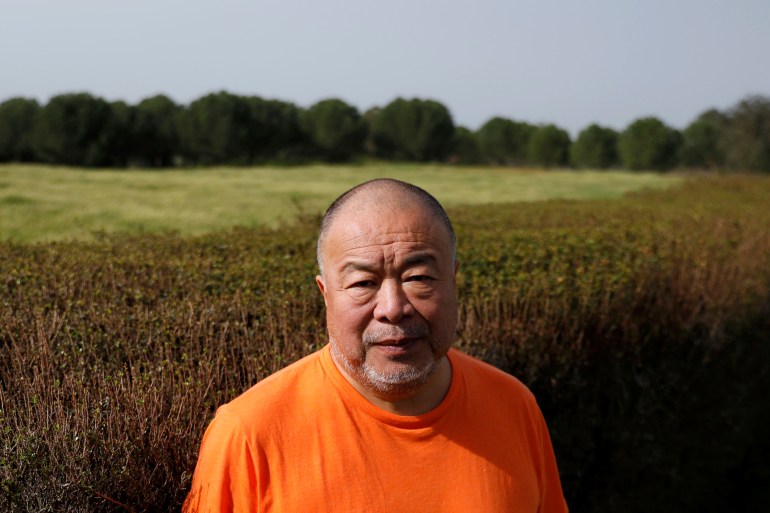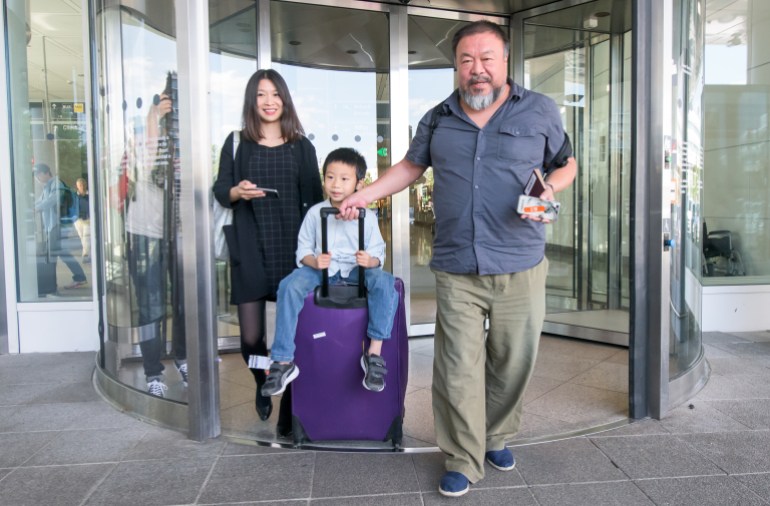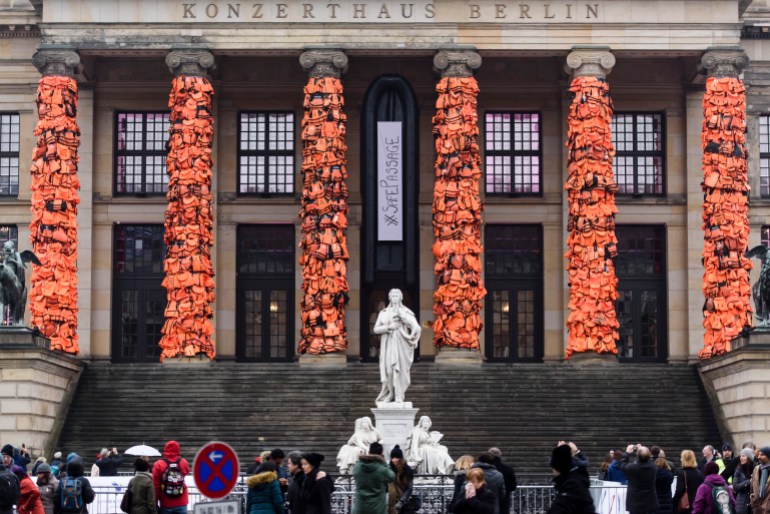Brutality of oppression: Ai Weiwei speaks on Gaza, China and New York City

“Power is afraid of art and poets,” writes Ai Weiwei in Zodiac: A Graphic Memoir.
He would know. The renowned artist is a notorious rankler of the powers that be, particularly in his native China, where Communist Party leadership came to fear him to such a ferocious degree that he has endured prison, torture and now exile.
“Why does power fear the arts,” I ask him.
“Every form of power solidifies its foundation on absolute conditions, emphasising uniformity in thoughts, pathways, speech, and behavioural patterns,” he responds. “This uniformity serves as the fundamental prerequisite for the assertion of power.
“Contrarily, art and poetry inherently defy the pre-established restrictions of human existence, venturing into uncharted territories. They are, in essence, endeavours to construct a novel reality, constituting a potent and destructive challenge to authoritarianism.”
Zodiac is the latest of many such challenges posed by Ai over the decades. Rich with metaphor, philosophical musings, and rebellious wisdom, the book is “comic” in the classical sense – a work of komikos in which mirth and myth, commentary and critique are all combined, and tragedy is never too far off.
In it, Ai relates a lifetime of creative struggle against power and repression, from his childhood during the politically fraught period following China’s Cultural Revolution to his early forays abroad as a student in New York City during the 1980s, on through his illustrious artistic career and the violent reaction it inspired. Unwilling to cede to self-censorship, Ai has endured the destruction of his Beijing studios by Chinese authorities, imprisonment – and his eventual need to flee the country once and for all.
Now he is facing censorship once again, this time in the form of a London show cancelled last November after he tweeted criticism of United States-Israel relations in the early days of Israel’s war on Gaza.
I interviewed Ai via email in the weeks leading up to the release of Zodiac (January 30, 2024) in a discussion that spanned his many years of living under political peril, the intentions behind censorship and oppression, and the importance of artistic expression.
Born into a ‘system of oppression’
Ai’s memoir opens with a scene from his childhood in China’s remote Xinjiang province, where his family was forced to live in an underground burrow due to the persecution and exile of his father – celebrated poet Ai Qing – in the wake of the country’s Great Leap Forward. Mao Zedong’s campaign intended to turbocharge the process of industrialisation in agrarian China, but its consequence was famine and a severe crackdown on intellectuals who were perceived as oppositional to Mao’s vision. In Zodiac, Ai describes how his family eked out their subterranean banishment as part of a “strange commune” where he took part in a competition to see who could catch the most mice. Ai won, accumulating a collection of their tails.
“The experience of growing up in an intensely politicised environment within the household of an intellectual subject to prolonged suppression and oppression was not different from the lives of others during that period in terms of material life,” he told me of this period. “During those times, everyone shared a common experience of living under the pervasive fear of politics.”
Sixty years later, Ai opens Zodiac with a scene between father and son in which the former warns the latter to avoid reading.
When I asked about it, he explained, “From my early years, I encountered discrimination and witnessed an unjust society, leading me to recognise that political oppression doesn’t emanate solely from those in power; rather, it permeates everyone’s ideology. In such oppressive circumstances, individuals willingly conform to the violence inherent in society, becoming conscious participants in the system of oppression. This type of society leaves victims with nowhere to hide, exposing them to harm on all fronts.”
After two decades of living in an Orwellian social structure, Ai decided enough was enough.
“Personally, the most discernible impact of the Cultural Revolution on me was the decision to leave China and move to the US. At that time, I perceived China as an abnormal and unsafe society,” he said. “In hindsight, at the post-Cultural Revolution time, China underwent changes, transitioning from an intensely politicised society under proletarian authoritarianism to a politically authoritarian yet simultaneously materialistic and capitalistic society in terms of lifestyle.”
What was it like, I ask, to leave such circumstances?
“The United States in the 1980s felt like an entirely different planet to me,” Ai responded. “Everything there, both in the realms of materiality and spirituality, severed any semblance of connection. Every new experience unfolded as an entirely novel world. While, to some extent, I attained the pinnacle of freedom, from an alternate viewpoint, I found myself subjected to the most stringent constraints.”

A young art student abroad
Ai spent more than a decade in the US, studying in Philadelphia and San Francisco before ending up in New York. There he struck up a friendship with poet Allen Ginsberg and discovered that the country he had come to was no stranger to brutality. When police were caught on film indiscriminately attacking protesters, community members and journalists while attempting to dismantle homeless encampments during the 1988 Tompkins Square Park incident, Ai happened to be there, taking photos, as he somewhat relentlessly photographed his time in the US.
Then, after 12 years, he decided to move on.
“It seemed to me that I had already obtained all things possible to me during my time there, and the prospect of discovering more unique experiences appeared elusive. Continuing my stay in the US would feel like a squandering of time. At that time, my father in China was ill, so it was a compelling motive to go back and stay by his side.”
Engagement with the human condition
Upon his return to China, Ai steadily gained recognition through his work, which challenged the social order at home as well as wide-ranging injustices abroad.
For his 1995 piece Han-Dynasty Urn with the Coca-Cola logo, for example, he stamped an ancient vase with the ubiquitous brand emblem, posing a question about consumerism’s growing effect on Chinese culture. His curation of the F*** Off exhibition in 2000 featured a slew of infamously provocative works – including one that may or may not have involved cannibalism. Then in 2007, Ai produced one of his most large-scale works yet – Fairytale – for which he brought 1,001 Chinese tourists from across the country to Kassel, Germany, to participate in the Documenta art festival.
The 2008 earthquake that devastated the Sichuan region prompted him to launch the Sichuan Names Project the following year, which drew the ire of the Chinese government by exposing its concealment of the staggering death toll and suggesting state policy was to blame for deadly infrastructure. In 2010, Ai contracted some 1,600 Chinese artisans to produce millions of handcrafted porcelain sunflower seeds in a meditation on individuality versus the collective.
With production so prodigious, I ask him whether he holds a fondness for any pieces in particular. Are there any that he regrets in retrospect?
“The so-called artworks of mine are all crafted from my thoughts and emotions,” Ai responded. “I do not regret having created them. They authentically reflect my true feelings and circumstances during those moments, intricately intertwined with the experiences of my upbringing. One doesn’t harbour regrets for their own growth; it is an inherent part of oneself, with no alternative possibility.”

Repressive reactions
Evidently, Chinese authorities did not share Ai’s enthusiasm. The Sichuan project in particular finally drew a repressive response.
“The Sichuan earthquake presented me with an opportunity to delve into the process through which individuals navigate self-preservation and uncover truths amidst social upheaval or catastrophe,” Ai says. “Meanwhile, it also plunged me into various troubles and conflicts with the government. My proactive involvement on the internet, including organising activism, triggered a chain reaction of consequences. It marked my initial foray into the most stringent form of resistance within the society of my upbringing, concurrently entangling me in a myriad of life challenges.”
Those challenges included the retaliatory destruction of Ai’s studios in Beijing. The buildings, said officials, were “illegal” for vague reasons chalked up to improper planning.
“As my relationship with the government deteriorated and conflicts escalated, my two studios faced demolitions – one after another,” Ai says. “The reasons cited for the demolitions were absurd, and the manner in which they were carried out exhibited a disturbing level of violence. It proved as formidable a force as an earthquake, albeit with a heightened intensity. This experience starkly exposed to me the vulnerability of the government I confronted and the ruthless nature of politics.”
Shortly after this, in 2011, Ai vanished into prison. For 81 days, the world speculated as to his condition before he was released into house arrest. This confinement marked him.
“Secret detainment has imparted at least two crucial revelations to me,” he says. “Firstly, it underscores that power operates beyond constraints, transcending the bounds of legality. Any authority acquired through illicit means possesses the audacity to openly engage in unlawful activities, evading the grip of the law.
“Secondly, it highlights that no protective shield envelopes me; no amount of support or advocacy guarantees my release. Despite enduring spiritual or physical torment, everything remains endurable when fueled by unwavering faith in one’s convictions; one would not regret actions born out of convictions. Yet, the awareness that power can inflict unbridled violence induces a profound sense of despair for the entire societal landscape.”

In 2015, the government finally returned Ai’s passport and he fled to Berlin, where he resided for a time before eventually relocating to Portugal, where he lives to this day.
“I had begun establishing my studio in Berlin before these events unfolded. Berlin, nestled between New York and Beijing, exuded a sense of familiarity that resonated with me. The city welcomed me wholeheartedly, offering me a teaching position at a university. Initially, the UK denied me a suitable visa under the pretext of criminal records, which struck me as utterly absurd.”
Does Ai ever tire of being a foreigner?
“I grew up in a place where I was treated as an outcast due to my father being labelled as the country’s enemy and consequently sent to exile,” he responds. “I hence lack the conventional notions of a homeland or hometown. Regardless of my residence, I perpetually embody the status of a ‘foreigner’.”
Ai considers his lack of fixed national identity to be advantageous.
“The significant advantage of this status lies in the liberty of not having to take sides; instead, one can independently form judgments,” he explains. “Yet, the primary drawback is the inherent challenge of establishing efficient communication, given the fundamental incompatibility between individual experiences and broader societal norms.”
That challenge has not stopped Ai from pursuing work focused on others searching for a home.
In 2016, he attached scores of orange life vests worn by drowned refugees to the columns outside Berlin’s Konzerthaus art museum. The year after that, he released the heartbreaking documentary Human Flow, for which he travelled to more than 20 countries filming the experiences of displaced peoples.
“What I find intriguing in my artworks is their inherent connection to people – their engagement with human conditions and the broader spectrum of humanity. Whether it’s my early piece Fairytale, which brought 1001 Chinese people to Documenta in Kassel, the Citizens’ Investigations following the Sichuan earthquake in 2008, or subsequent projects such as Human Flow, all of them emerged from my active involvement in reality, aiming to establish connections with and understanding of diverse groups of people.”

Ongoing opposition to power
Though Ai has left China, his genius for creating controversy abides. This tendency extends beyond his art to his use of the internet as a platform for political advocacy.
In his recent, now-deleted tweet, which resulted in the cancellation of his London show, Ai wrote: “The sense of guilt around the persecution of the Jewish people has been, at times, transferred to offset the Arab world. Financially, culturally, and in terms of media influence, the Jewish community has had a significant presence in the United States. The annual $3bn aid package to Israel has, for decades, been touted as one of the most valuable investments the United States has ever made. This partnership is often described as one of shared destiny.”
A few days later, Ai shared a statement that the impending show was “effectively cancelled” by the gallery, which released its own statement explaining it was “not the right time to present his new body of work” because there was “no place for debate that can be characterised as anti-Semitic or Islamophobic at a time when all efforts should be on ending the tragic suffering in Israeli and Palestinian territories”.
I ask Ai if it was an act of censorship.
“Any imposition on individual thoughts, attitudes, speech, or artistic expression, whether through direct power or established systems of punishment and reward, constitutes censorship,” he responds. “Censorship not only dictates how power expands, but also exposes its own fragility and incapacity to confront genuine arguments and diverse thoughts.”
Several years ago, Ai had the opportunity to witness the situation in Gaza firsthand.
“In 2016, during the making of Human Flow, I travelled to Gaza. Despite difficulties, I persisted and eventually obtained military permission from Israel, granting me the permit to enter and exit Gaza,” he said. “While in Gaza, I witnessed the lives of its people, including children, women, and ordinary citizens, who grapple with survival under the weight of daily and unjust violence.
“Even as someone who grew up in an extremely authoritarian Communist country, such conditions were almost unbelievable to me,” Ai said, adding that the “suppression and humiliation were experiences beyond my previous imagination. The stark reality of such a confinement in the 21st century left me utterly astonished.”
During the current war, the brutality of that reality has been made even more explicit by the wholesale killing of journalists reporting from Gaza. Under international law, warring parties are supposed to ensure that they do not target members of the press. But as of this writing, the verified number of journalists killed stands at 83. According to the Committee to Protect Journalists, this has been the deadliest war for journalists since the organisation launched in 1992.

I ask Ai about the many journalists, writers and artists killed.
“There exists an old Chinese idiom: ‘When two armies fight against each other, the messengers should not be hurt,’” he says. “This principle serves as the foundational criterion for assessing the justice of a war. If a war claims to possess a certain degree of justice, it must, above all, allow for global judgement in an open and transparent manner. A war that seeks to achieve its goals by harming messengers is undoubtedly a war deemed unjust.”
In Zodiac, Ai asserts, “We must not be scared of too much truth.” Why, I ask, do people fear the truth?
“Reality, contrary to being constructed solely from truths or facts, constitutes the superficial layer of our comprehension,” he says. “The education we receive and the prevailing public opinions can potentially shape a deceptive reality. Speaking the truth, therefore, might pose a public hazard for those who dare to voice it.
“Censorship, fundamentally rooted in power, takes direct aim at voices deviating from publicly accepted values and widely disseminated information. The suppression of these voices poses a direct challenge to the legitimacy of power. In a civil society, every citizen possesses not only the right but also the obligation to articulate their thoughts.”
So what should artists around the world do to counter this censorship?
“Speak your thoughts loudly,” says Ai, “and without considering the consequences.”
Ai Weiwei’s Zodiac: A Graphic Memoir goes on sale on January 30, 2024.
Related
Weekly Chinese Horoscope from March 10-16, 2025
Rat (1948, 1960, 1972, 1984, 1996, 2008, 2020)Love has a way of bringing unexpected magic into your life if you’re willing to open your heart to it. This we
Your Weekly Horoscope Is “Major” For These 5 Signs
Another week means it's time for another weekly horoscope! We've got a Lunar Eclipse, Mercury retrograde, and more astrological events coloring the week, so the
Horoscope Tomorrow, March 09, 2025: Your zodiac insights await –…
Aries It would be wise to spend today taking care of tasks and enjoying time at home. At the workplace, you may establish yourself as a leader. There is no be
Horoscope Tomorrow, March 09, 2025, read predictions for all sun…
Aries (Mar 21-Apr 20)Great opportunities and happy moments await you tomorrow. Throughout the day, you shall soak up all that positive energy through messages












